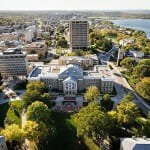Category State & Global
International law program names associate director
Legal scholar and attorney Sumudu Atapattu has been named associate director of the Global Legal Studies Initiative, a joint program of the University of Wisconsin–Madison Law School and UW–Madison Division of International Studies.
Badger Poll results to be released July 17-19
The opinions of Wisconsin residents on a range of issues - from President Bush's job performance to immigration to the proposed state constitutional amendment outlawing same-sex marriage - will be released to the media next week.
Digging in Denmark, archaeologist uncovers rare prize
University of Wisconsin–Madison archaeologist T. Douglas Price has received the unique distinction of being the first non-Dane to be awarded the Westerby Prize, Denmark's pre-eminent award for archaeology.
Political scientist named to Fulbright professorship in Australia
Kenneth Mayer, professor of political science at the University of Wisconsin–Madison, has been named to a Fulbright Distinguished Chair at the Australian National University (ANU) in Canberra.
NSF grants bolster integrative graduate study
Twin grants from the National Science Foundation (NSF), coupled with matching institutional funds, will give a $6.8 million boost to innovative graduate study and research in global sustainability, development, and the environment at the University of Wisconsin–Madison.
Babcock Institute receives export achievement award
The Babcock Institute for International Dairy Research and Development received a 2006 Governor's Export Achievement Award - Agricultural Support Service Providers at the 42nd annual Wisconsin International Trade Conference May 9 in Milwaukee.
International Learning Community connects language learning, living
The University of Wisconsin–Madison launched its International Learning Community in 2002-03 with a German language house, Stockwerk Deutsch. Since its inception, the program has quickly expanded from 66 to 131 residents.
Book Smart
Before the Chilean government vanquished the indigenous Mapuche people at the end of the 19th century, heavy forests and abundant rivers, lakes and coastal inlets teemed with resources, everything the Mapuche needed to survive. “When they were resettled after the military defeat, they were left with a fraction of their original territory and without the skills or tools to farm it appropriately,”Florencia Mallon, professor of history, says. Not surprisingly, poverty followed.
Conference to address status of less commonly taught languages in U.S.
The ninth annual meeting of the National Council of Less Commonly Taught Languages will explore issues surrounding heritage language learning, bilingual education, distance learning, outreach and advocacy initiatives, as well as the use of technology in teaching less commonly taught languages, including controversies and pedagogical implications in the teaching of Arabic.
International outreach conference to examine best practices
Wisconsin’s State Superintendent of Public Instruction, Elizabeth Burmaster, will be the keynote speaker at the upcoming Title VI and Fulbright-Hays National Outreach Conference, as world studies outreach specialists from across the nation come together April 27-29 in Madison.
UW MBA students win international competition
University of Wisconsin–Madison MBA students placed first in the annual Center for International Business Education and Research (CIBER) MBA International Business Case Competition, held April 6-9.
Journalist Hugh Pope to speak
Former Wall Street Journal correspondent Hugh Pope, a leading expert on Turkey, will visit the University of Wisconsin–Madison later this month.
Series of talks to examine culture, conflict in Iraq
The Division of International Studies at the University of Wisconsin–Madison announces a series of talks, "Three Perspectives on Iraq, Three Years Later," to be held at UW–Madison on Monday, April 17, and Tuesday, April 18.
French House gathers campus, city community together à table
The French House, the nation's oldest residential language immersion community, was founded in 1918 and began opening its doors to the campus and the public for weekly lunches and dinner shortly thereafter. Director Andrew Irving warns that there is but one restriction on these soirees: You must speak French.
Cell barrier slows bird flu’s spread among humans
Although more than 100 people have been infected with the H5N1 avian influenza virus, mostly from close contact with infected poultry, the fact that the virus does not spread easily from its pioneering human hosts to other humans has been a biomedical puzzle.
From neighbors to killers: Book explores the personal horror of Rwanda’s genocide
"Intimate Enemy," a new book by political scientist Scott Straus, deals head-on with one of the most disturbing aspects of the 1994 genocide in Rwanda - that it was carried out, in essence, by everyday people, who quickly transformed from neighbors to killers.
UW-Madison reaffirms commitment to licensing proposal
UW-Madison has reaffirmed its commitment to a proposal by the Workers' Rights Consortium (WRC) and United Students Against Sweatshops (USAS) to improve the working conditions of apparel workers around the world.
Polar neutrino observatory takes a big step forward
An international team of scientists and engineers has taken a major step toward completion of what will be the world's preeminent cosmic neutrino observatory, harnessing a sophisticated hot-water drill to build an observatory under the South Pole that eventually will encompass a cubic kilometer of ice.
International Institute celebrates 10 years as portal to the world
An interview with Gilles Bousquet, who has been dean of International Studies and director of the International Institute since 2002 and is a professor of French.

